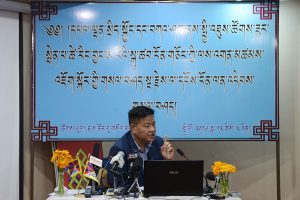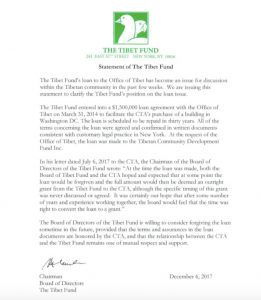
Photo: Tibet Sun
Penpa Tsering, the former Speaker of the Tibetan Parliament in exile and Representative of the Dalai Lama in North America, has responded to the Kashag (Tibetan Cabinet) charges against him following his sudden termination last month from the post of Representative. His rebuttal was contained in a 97-page document contesting each allegation point by point.
At a press conference which took over three hours he challenged the Kashag to prove their charges. Should they not do so he vowed to take further action. He said that although he did not accept the Kashag’s accusations, he accepted his termination, as it was the Kashag’s right to terminate the services of Representatives.
Following his dismissal on November 7, the Kashag issued a ten-point statement on November18, giving details of why Penpa Tsering’s position had been terminated, each of which he has refuted:
- • The first point was an introduction which included mention of three warnings being served on Tsering. Tsering acknowledged receiving only one.
- • Point two contains allegations that he did not submit any formal reports. Penpa responded that an order had been issued by the Department of Information and International Relations to submit reports only on April 20,2017.
- • He denied the allegation of insubordination in point three with regard to the announcement of Kunga Tashi as Chinese Liaison Officer in New York.
- • Point four concerned not reporting “Dholgyal-related activities.” He said that this had been fully reported as required.
- • The fifth point accused Tsering of being “unable to schedule any such meetings for Sikyong” with senior members of the United States government. In response he produced several documents to prove that he contacted and tried to schedule meetings, but said that because of short notice no meetings had materialised.
- • Point six cites “negligence raising funds” Tsering replied that as the Donald Trump administration was new, many initial contacts had still to be made. Despite that, his efforts had helped to ensure continued funding assistance from the US government.
- • With respect to point seven, the “closure of five bank accounts” of the Office of Tibet in Washington, Penpa Tsering said that this had been due to political reasons. “There wasn’t anything we could do about the closure.”
- • Point eight touches the sensitive matter of the US$ 1.5 million transaction between the Tibet Fund and Office of Tibet. The allegation states that “the amount was not a loan.” Tsering points out that it was in fact accounted as a loan in the Tibet Fund books, but there was no documentation showing that the Office of Tibet is liable for repayment of the loan. He felt that it was necessary to reconcile this discrepancy. He asked an auditor for assistance who told him that he would ask his senior in Dharamshala about finding a solution. Tsering was charged by Sikyong for instigating that the auditor mention the loan issue in the audit report. His response to this charge was, “If raising such an issue was seen as insubordination, then why should there be meetings? If we are not able to raise issues and are to just follow orders, wouldn’t that be an autocracy, not a democracy?”
- • Concerning point nine, Tsering denied the Kashag’s charge that “he tried hard to convince a female Kalon nominee against working with Sikyong.”
- • The tenth point was a summary of the firing of Penpa Tsering and of providing for his replacement.

Photo: Screengrab
The Tibet Fund clarifies their position regarding the loan
Following the controversy that has arisen around the issue of the loan from the Tibet Fund, the Tibet Fund has issued a statement which makes it clear the US$1.5 million was a 30-year loan for the purchase of a building, drawn up legally, but that, at the time it was drawn up, it was hoped that it would eventually be “forgiven”and subsequently “deemed an outright grant” on condition of the CTA honoring the terms and condition of the loan and “where the relationship between CTA and Tibet remains one of mutual respect and support”.
The Tibet Fund is based in New York and provides funding assistance to the Tibetan exile community. It relies heavily on funding from the US government. Its mission statement says that it works to preserve “the distinct cultural and national identity of the Tibetan people”.




 Print
Print Email
Email